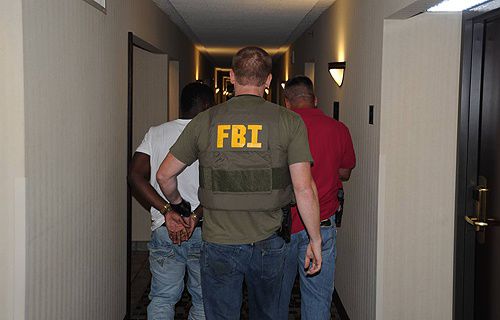The arrest of nearly 300 suspected pimps and rescue of 168 children in a national bust of child sex trafficking rings across the country has drawn attention to the problem of modern slavery. “These are not children living in some faraway place, far from everyday life,” said FBI director James B. Comey during a June 23 press conference in Washington, D.C. “These are our kids. On our street corners. Our truck stops. Our motels. These are America’s children.” “The lesson of Operation Cross Country is that our children are not for sale,” he stressed. The crackdown on sex trafficking in 106 U.S. cities was labeled “Operation Cross Country VIII” and was part of an ongoing effort to stop the exploitation of minors through the Innocence Lost National Initiative. During the week-long series of enforcement, FBI, state and local authorities recovered 168 child victims of sexual exploitation and arrested 281 suspected pimps. Since its 2003 inception with the FBI and Department of Justice, partnered with the National Center for Missing and Exploited Children, the Innocence Lost National Initiative has identified and recovered approximately 3,600 minors and contributed to 1,450 convictions and seizure of $3.1 million in assets, the FBI said. The bust coincided with the June 20 release of the 2014 State Department Trafficking in Persons report, which details the state of human trafficking in countries around the globe throughout the past year. In addition to sex trafficking, the report also monitors compelled labor, child soldiers and human trafficking for other purposes through force, fraud, or coercion. The annual report, which is required by the Trafficking Victims Protection Act of 2000, ranks countries in a three-tier system according to their compliance with minimum standards for combatting human trafficking. By law, countries on Tier 3 — the worst category of offender — may face certain restrictions, including a withholding of non-humanitarian funding and cultural exchange programs, and U.S. opposition to those countries receiving assistance from the International Monetary Fund and the World Bank. In the 2014 report, the countries of Algeria, Central African Republic, the Democratic Republic Of the Congo, Cuba, Equatorial Guinea, Eritrea, Gambia, Guinea-Bissau, Iran, North Korea, Kuwait, Libya, Malaysia, Mauritania, Papua New Guinea, Russia, Saudi Arabia, Syria, Thailand, Uzbekistan, Venezuela, Yemen and Zimbabwe were named to the Tier 3 list for their failure to “fully comply with the minimum standards” and inability to make “significant efforts to do so.” Malaysia, Thailand and Venezuela were downgraded from the Tier 2 Watch List to Tier 3 because of their inability to take improve human trafficking responses enough to merit an upgrade in the past two years. Though Burma has been on the Tier 2 Watch List for more than two years, it received a waiver to avoid this downgrade. The report said that while the country’s efforts were inadequate, its government is “devoting sufficient resources to implement” a significant written plan to fight trafficking. U.S. Secretary of State John Kerry described the report as “a call to action.” “It’s a call to conscience. It is a reminder of what happens in many dark places that need light,” he said at a June 20 press conference for the release of the Trafficking in Persons Report. Warning that that there is “perhaps no greater threat to human dignity and no greater assault on basic freedom than the evil of human trafficking,” Kerry pledged that the U.S. will work to put an end to the practice, which he labeled “slavery, even in the 21st century.” The Trafficking in Persons report detailed innovations and improvements in the response to human trafficking, including the use of the private sector, education among law enforcement personnel and the use of technology to aid victims and identify those involved in exploitation. A broad response to the problem is necessary, Kerry said, because human trafficking “affects every country in the world, including ours.” He noted that “modern slavery does not exist in a vacuum,” but is connected to “many other 21st century challenges” including drug and arms trafficking and international crime. He said the State Department will be working with non-profits to “develop a risk assessment tool” to alert business leaders of human trafficking risks in parts of their supply chains around the world, as well as to help businesses ensure fair wages and treatment for workers. Rep. Chris Smith (R- N.J.), architect of the Trafficking Victims Protection Act of 2000, praised the progress and promise the report showed, but criticized some of the its rankings — particularly the exemption of Burma from an automatic downgrade to Tier 3 and the upgrade of China to the Tier 2 Watch List. “The importance of accurate Tier rankings and TIP [Trafficking in Persons] Report country profiles cannot be overstated,” Smith urged, arguing that a premature boost to Tier 2 may not only undermine progress, but “fail to inspire it among countries actually doing the hard work.” Still, he said, the Trafficking in Persons report and its ranking system “is ensuring more accountability and progress than ever before” in the fight against human trafficking. “This year’s report shows progress, but marks the way forward to rid the world of this gross violation of human dignity.”

